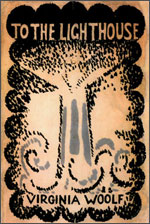| |
Pre-1950s |
| |
The Awakening, Kate Chopin
Black Spring, Henry Miller
Brideshead Revisited, Evelyn Waugh
A Christmas Carol, Charles Dickens
Crime and Punishment, Fyodor Dostoyevsky
Demian, Hermann Hesse
Embers, Sándor Márai
Frankenstein, Or, The Modern Prometheus, Mary Shelley
The Grapes of Wrath, John Steinbeck
The Heart is a Lonely Hunter, Carson McCullers
Howards End, E.M. Forster
The Iceman Cometh, Eugene O’Neill
In Our Time, Ernest Hemingway
The Man with the Golden Arm, Nelson Algren
Metamorphosis, Franz Kafka
The Picture of Dorian Gray, Oscar Wilde
The Poetical Works of John Keats, John Keats
The Sheltering Sky, Paul Bowles
Lost Face, Jack London
Nineteen Eighty-Four, George Orwell
The Poems of Dylan Thomas, Dylan Thomas
To the Lighthouse, Virginia Woolf
Wuthering Heights, Emily Brontë |
|
|
To the Lighthouse, Virginia Woolf
Horgath Press, May 5, 1927
Oh how beautiful. How far away. The sad and beautiful light that shines.
The autumn trees, ravaged as they are, take on the flash of tattered flags kindling in the gloom of cool cathedral caves where gold letters on marble pages describe death in battle and how bones bleach and burn far away in Indian sands. The autumn trees gleam in the yellow moonlight, in the light of the harvest moons, the light which mellows the energy of labour, and smooths the stubble, and brings the wave tapping blue to the shore.
It’s within distance. You can reach it. Stretch out your hand and take mine, please. Mind your step. That’s it. Please take a seat. Hold on. It’s only the smell of the sea. Moss-rock and cut of shore rose. Can you feel the slap of salt to the cheek? Excuse me, just scoot over, please. Don’t worry, I’m a married man, Madame. We’ll get there quick enough. See the pastel lines of the sky? How they bathe the sea? All this water! These waves! Our lives are waves, Madame, or so they say, slapping the shore. Blue yelps and green screams. Dolphin kisses at the bottom of the sea. If you could paint a picture—paint it just there, yes—the whole immutable world would come to light. Night and dark, light and sea, and we, sad boats we are, drifting just there, just here in the long and horrible middle—or something like that. . . . Hold on. It won’t be long, I promise. Put your hand to the cold wave. Feel the sea. It doesn’t bite. See how beautiful it is? Here, touch my face. Feel the lines. The lines of a hundred thousand nights.
But what after all is one night? A short space, especially when the darkness dims so soon, and so soon a bird sings, a cock crows, or a faint green quickens, like a turning leaf, in the hollow of the wave. Night, however, succeeds to night. The winter holds a pack of them in store and deals them equally, evenly, with indefatigable fingers. They lengthen; they darken. Some of them hold aloft clear planets, plates of brightness.
See your children back there? They love you Mam. They do. You’ve done them good. Yes. I can see. See how they run and play? You come here every summer, yeah? Seen you before I have. And the old man, too, in the garden. Uncle? And the pretty girl who paints. She sits and paints like the world has no end. Your husband he’s a tall one ain’t he. Stately. What a beautiful lot you all are. What a house. Summer house, right? Nothing like a house on the sea. Don’t shiver there now darling. Here, take my coat. The blows can be mighty hard out here. Knock you right over in a whale-beat. Button up my dear. It’s damn cold out here but It’ll be warm where we’re goin’. We’re almost there.
What was it then? What did it mean? Could things thrust their hands up and grip one; could the blade cut; the fist grasp? Was there no safety? No learning by heart the ways of the world? No guide, no shelter, but all was miracle, and leaping from the pinnacle of a tower into the air?
You could ride each wave to the ends of the earth. Ride it forever. Never come back. Don’t mean to scare you, dear. I’m an old man I know. So please be patient with me. I mean you no harm. We’ll get there together but afterwards you’re on your own. Your children love you, Mam. Your husband, too. But they won’t know it truly, they won’t really know it fully, not know it at all until you’re gone. So get back to them quick, my dear. Hold them tight. Look how beautiful their faces are. Like a million blazing suns. They’ll shine on forever if you just let them. See how they catch the wave? Look! Just there! You can snatch them with your hand. Reach out your hand, dear. They love you so.
‘Oh how beautiful!’ For the great plateful of blue water was before her, the hoary Lighthouse, distant, austere, in the midst; and on the right, as far as the eye could see.
_______________________________
If they shouted loud enough Mrs. Ramsey would return. ‘Mrs. Ramsey!’ she said aloud ‘Mrs. Ramsey!’
-TD

|
|
 |

